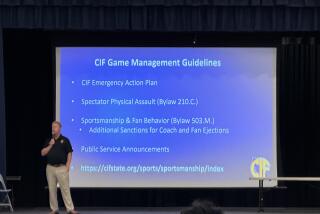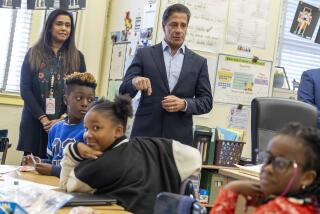Basketball or Football? Jump Ball : Preps: Movement afoot to switch winter sports to fall would involve athletes making difficult choices.
- Share via
Winter-season sports in the Los Angeles Unified School District might be moved to fall schedules in 1991 to accommodate the district’s switch to year-round school.
The district will begin year-round school on July 1, 1991. But because over-crowding is not a problem at many of them, fewer than 10 of the district’s 49 high schools will be open all year. The rest will follow a new calendar, and most will be closed from late December until mid-February.
That is during the peak of the winter sports season, so the district is considering moving the start of those sports to late September or early October, so they can end with the closing of schools in late December.
Winter sports affected would be boys’ and girls’ basketball, boys’ and girls’ soccer and boys’ wrestling. Athletes who compete in fall and winter sports would have to choose one, because the winter-sport seasons would conflict with the traditional fall sports.
The potential conflict has divided the district athletic office and the school board.
Jackie Goldberg, president of the school board, said all the fuss is unwarranted.
“Do you really think we would have the winter season during the fall?” she asked. “It doesn’t make sense. It won’t happen. It just won’t happen.”
However, Goldberg, who represents central Los Angeles, admitted she can’t say implementation of such a plan is impossible.
Said school board member Julie Korenstein, who represents the West Valley: “Everybody on the board keeps telling me not to worry, that everything will work out. I don’t believe them. We have a lot of things to work out, and I don’t know why they are saying there will be no problems. I foresee a lot of problems. There are a lot of glitches to work out.”
Hal Harkness, commissioner of City athletics, said Goldberg’s remarks do not ease his fears. He said his office has begun preparation for moving up the winter sports season.
“I don’t know how we can conduct business when the schools are closed down for six or seven weeks in the winter,” Harkness said. “Right now I’m working on adopting things within the parameters I’ve been given. It doesn’t matter whether I like the options or not. It’s my job to deal with the cards I’ve been dealt.”
The school board will meet Jan. 14 to decide which schools will have enrollments large enough to require year-round scheduling.
Phil Nassief, director of instruction in the senior high school division, said his department will recommend that the winter sports season be switched to match the students’ school schedule.
“We are aware this is going to create a big fuss among students, coaches and parents,” Nassief said. “I can’t give out all the details of our recommendations because they haven’t been released yet.”
Although Harkness said no sports would be eliminated in the beginning, there is speculation that junior varsity teams may be dropped in some sports.
The school board voted for year-round school last February as a way of handling projected growth, choosing the common calendar for all schools to ease the transition.
Currently, winter sports begin practice the first week in November and finish their seasons by the end of February. Schools that qualify for the state basketball tournament may extend their seasons to early March.
City schools have dominated the boys’ state basketball tournament, winning six of the last 10 Division I championships. If the season is switched to the fall, it is uncertain if City teams would be eligible for the state tournament.
“If their seasons are over by the end of December, they’d be out of the game for six weeks or more before our tournament,” said Ray Bell, director of the state basketball tournament. “We’d have to discuss this with the CIF state office and get a ruling from them. It certainly would create some problems.”
Said Sam Sullivan, Fremont High boys’ basketball coach: “How do you expect to have kids sharp and ready to go for state when they haven’t played in a month or two? The whole thing is ludicrous. The school board obviously wasn’t thinking about athletics when they decided it was necessary to have common calendars. This is really going to hurt kids, and it’s kids that the school board is supposed to be watching out for.”
School board member Rita Walters, who represents South-Central Los Angeles, said the board does not make decisions based on sports considerations.
“Sports can’t be our reason for existing,” Walters said. “Adjustments will need to be made in people’s thinking and how we go about doing things. Nothing we’ve entered into is without careful consideration.”
According to the common calendar, schools not in session year-round will operate from mid-August until Christmas break. Classes will resume in mid-February and continue through late June. Schools not on year-round status will be closed during the vacation periods.
Goldberg said that individual schools could elect to hold intersession classes during down periods to allow students a chance to make up a failing grade or catch up on credits. Intersession is the equivalent of summer school.
“If schools choose to have intersession during the winter then they won’t be closed down and none of this will be a problem,” Goldberg said.
Harkness said that intersession may not be the remedy because physical education classes--ideal for coaches involved in winter sports to teach--are not usually offered during such periods. Harkness also said that most classes offered during intersession are usually out by noon or 1 p.m. Basketball and soccer games and wrestling matches normally do not begin until 3 p.m. or later.
“We would have a real hard time getting faculty members to stick around to help work these games,” he said. “And how many fans do you think would attend? There’s also the question of how the bus system would work during such a time, since many of the students in our district are bused from other areas. Also, would we pay coaches to come back from vacation?”
If the winter seasons are moved to the fall, facilities will be taxed. Football will have to share outdoor fields with soccer, and gymnasiums will have to accommodate girls’ volleyball, boys’ and girls’ basketball and wrestling.
“I can tell you that it would be a logistic nightmare scheduling all those teams in our gym,” said Jeff Davis, boys’ basketball coach at Canoga Park High. “I don’t know that it would be possible. Then you also have to worry about junior varsity teams for each of those sports. What happens to them? Do you just cancel them?”
Davis, vice president of the Los Angeles Coaches’ Assn., hopes he can mount enough support among coaches, students and parents to make the school board reconsider the common calendar. He wonders why a school such as Canoga Park, with declining enrollment, needs to follow a year-round class schedule.
“If a school isn’t overcrowded then it shouldn’t be necessary for them to be on a year-round schedule,” he said. “They should stay on a traditional calendar. Schools that need to be on a year-round schedule will be open during the winter, so sports wouldn’t be a problem. But for those of us that will be shut down for seven weeks during the winter, the season becomes a real problem.”
Davis is sending out letters to all members, asking for their input. He plans to announce the responses at an open meeting Harkness has scheduled for Jan. 22.
Wendy Triplett, the girls’ volleyball and basketball coach at Marshall High, is president of the Coaches of Los Angeles Women’s Sports. She said the group is discussing problems that will result from moving of winter seasons and plans to present the findings at the meeting.
Hank Nozaki, the boys’ soccer coach at San Pedro High, said his school recently was chosen by the National Soccer Coaches’ Assn. as one of the top 20 programs in the country. If the season is moved opposite football and cross-country, Nozaki said he’s bound to lose some of his best players.
“This is going to screw up everything,” said Nozaki, who has won two City titles. “It would be very bad for the continued growth of soccer.”
The shifting of winter sports also would mean shorter seasons. Nonconference games and participation in tournaments would be almost nonexistent. The basketball season would probably entail 14 conference games, culminated by the playoffs. Most schools play 25 games in a winter season.
“We haven’t even started our league schedule yet and we’ve already played 12 games,” Davis said. “Even after 12 games, this team is just finding the right chemistry, and the kids are becoming comfortable with each other. If we move the season up, our season would be almost over after 12 games. Coaching would not be nearly as much fun.”
Many coaches are worried that top athletes would flock to schools outside the district.
“It would ruin City basketball,” Sullivan said. “We would lose every top player. They would transfer to Southern Section schools that follow a traditional calendar.”
More to Read
Get our high school sports newsletter
Prep Rally is devoted to the SoCal high school sports experience, bringing you scores, stories and a behind-the-scenes look at what makes prep sports so popular.
You may occasionally receive promotional content from the Los Angeles Times.






